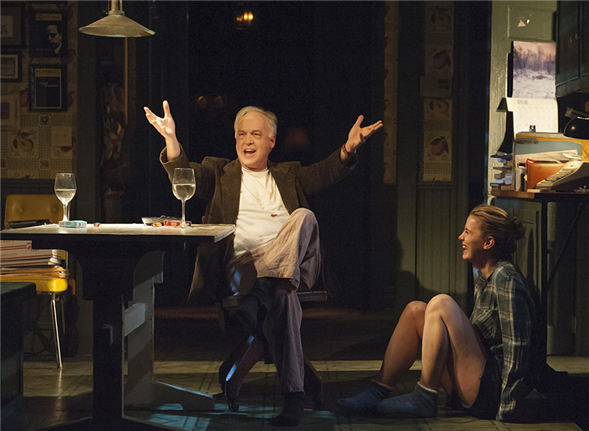By MARK BLANKENSHIP
Maybe you know a theatrical person. Maybe they squeal with rapture when they get a great deal on paper towels. Maybe they rage like an opera villain when Verizon drops a phone call. These megawatt people can be intense, but they're also incredibly captivating, turning every brunch into a platform for passion.
For playwright Halley Feiffer, these are the folks who make good drama. "There are people who are kind of heightened, and sometimes I'm one of them," she says. "And when the stakes are really high, a lot of people do swing between these places where everything is either desperately tragic or euphorically, orgasmically amazing. I'm interested in putting that on stage."
Which brings us to her play I'm Gonna Pray for You So Hard, now at Atlantic Theater Company's Stage 2. It imagines two crucial encounters between Ella, a burgeoning actress, and David, her legendary playwright father. In the first scene, father and daughter wait in their kitchen for the reviews of her latest performance, and as their anxiety mounts, they go through a lifetime's worth of rituals. David makes thundering pronouncements, Ella cheers and gasps in all the right places, and both of them goad each other to get bigger, bigger, bigger.
There's a dark thread in their performances, though, and eventually we see the need and fear and brutality beneath their banter. By the second scene, on the set of one of Ella's later plays, those heavy emotions have transformed the show in startling ways, making us consider how family strife alters the way we speak, think, and even move.
Or put another way: The play gets less and less realistic as the feelings get more and more intense. It's like David and Ella's thundering dysfunction warps the very room they're standing in.
"It's a bit heightened, and I think that's appropriate because these characters are heightened," Feiffer says. "The style and tone of the play need to match that."
As she's developed the show, Feiffer has learned how far to push the needle. In early drafts, for instance, the characters spoke in an extremely artificial way, with certain phrases repeated over and over. "I was enamored with the style of it, but I realized it was trivializing some of the heavier moments of the play and distracting from what was happening," she says. "So that's been our biggest challenge: Paring it down and building it up in the right proportions so that we're best able to tell the story."
She credits Reed Birney and Betty Gilpin---who play David and Ella---for helping craft the language, and she says director Trip Cullman helped conceive the shift between the first and second scenes. Instead of a blackout, we actually see the stage crew dismantle the kitchen, leaving an empty stage for the next confrontation.
"For me, that's exciting," Feiffer says. "For one thing, it feels almost violent to take this hyper-realistic space and then show us with just a few tricks that it's a set. It calls attention to the theatricality and that these are theatre people. And not to put too fine a point on it, but it shines a light on the ephemeral nature of what we do in our relationships with our family."
---
Mark Blankenship is TDF's online content editor
Photo by Ahron Foster
